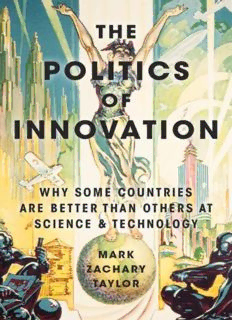
The Politics of Innovation: Why Some Countries Are Better Than Others at Science and Technology PDF
Preview The Politics of Innovation: Why Some Countries Are Better Than Others at Science and Technology
The Politics of Innovation The Politics of Innovation Why Some Countries Are Better Than Others at Science and Technology MARK ZACHARY TAYLOR 1 1 Oxford University Press is a department of the University of Oxford. It furthers the University’s objective of excellence in research, scholarship, and education by publishing worldwide. Oxford is a registered trade mark of Oxford University Press in the UK and certain other countries. Published in the United States of America by Oxford University Press 198 Madison Avenue, New York, NY 10016, United States of America. © Oxford University Press 2016 All rights reserved. No part of this publication may be reproduced, stored in a retrieval system, or transmitted, in any form or by any means, without the prior permission in writing of Oxford University Press, or as expressly permitted by law, by license, or under terms agreed with the appropriate reproduction rights organization. Inquiries concerning reproduction outside the scope of the above should be sent to the Rights Department, Oxford University Press, at the address above. You must not circulate this work in any other form and you must impose this same condition on any acquirer. Library of Congress Cataloging-in-Publication Data Names: Taylor, Mark Zachary. Title: The politics of innovation: why some countries are better than others at science and technology / Mark Zachary Taylor. Description: New York, NY: Oxford University Press, [2016] | Includes bibliographical references and index. Identifiers: LCCN 2015043791 (print) | LCCN 2015045387 (ebook) | ISBN 978–0–19–046412–7 (hardcover: alk. paper) | ISBN 978–0–19–046413–4 (pbk.: alk. paper) | ISBN 978–0–19–046414–1 (E-book) | ISBN 978–0–19–046415–8 (E-book) | ISBN 978–0–19–060925–2 (Online Component) Subjects: LCSH: Science and state. | Technology and state. Classification: LCC Q125 .T34 2016 (print) | LCC Q125 (ebook) | DDC 338.9/26—dc23 LC record available at http://lccn.loc.gov/2015043791 1 3 5 7 9 8 6 4 2 Printed by Webcom, Canada This book is dedicated to D. Allan Bromley, who dared to take a risk on me when I was young and overly ambitious; and to James Burke, Joel Mokyr, and Richard R. Nelson, who have for years inspired me with fascinating scholarship and wonderful prose. CONTENTS Acknowledgments ix Country Codes xi PART ONE CARDWELL’S LAW 1. Introduction— The Puzzle of Cardwell’s Law 3 2. Measuring the Black Box 25 3. Cardwell’s Law in Action 40 PART TWO HOW DO NATIONS INNOVATE?— POLICIES AND INSTITUTIONS 4. Does Technology Need Government?— The Five Pillars of Innovation 69 5. “Why Nations Fail”— Capitalism, Democracy, and Decentralization 107 6. How Nations Succeed— Networks, Clusters, and Standards 140 PART THREE WHY DO NATIONS INNOVATE?—C REATIVE INSECURITY 7. Technological Losers and Political Resistance to Innovation 183 vii viii Contents 8. Creative Insecurity— Olson’s Nemesis 215 9. Critical Cases of Creative Insecurity 243 10. Conclusion— Creative Insecurity and Its Implications 275 APPENDICES DEFINITIONS, MEASUREMENT, AND DATA Appendix 1. The Great Definitions (Non)Debate 301 Appendix 2. A Brief History of Innovation Measurement 310 Appendix 3. Tour of Innovation Measures, Data, and Sources 318 Notes 331 References 365 Index 403 ACKNOWLEDGMENTS First and foremost, thanks to Dan Winship, my friends, and my family, who sup- ported (and tolerated) me during the tumultuous years of writing this book. Without them, it simply could not have been written. To my mentors who have supported me throughout the very tough process of building my research program which led to this book, I wish to thank: Dan Breznitz, Richard Doner, David Hart, Julia Lane, Michael Piore, and J. P. Singh. An enormous debt is also owed to those leading scholars who took the time to give me guidance and advice over the years: Alice Amsden, Sheila Jasanoff, Loet Leydesdorff, Robert Litan, Ben Martin, Joel Mokyr, Richard R. Nelson, Daniel Sarewitz, Phil Shapira, Merritt Roe Smith, Robert Solow, and Paula Stephan. People who thoughtfully read and critique entire drafts of manuscripts deserve a special place in the afterlife. I give my nominations to Roselyn Hsueh, David McBride, Michael Murphree, Abe Newman, Darius Ornston, and Dan Winship. Each individual chapter has its own specialty and focus. To those experts who read and advised me in their particular subject area, I give thanks to: Dan Breznitz, Chappell Lawson, Austin Long, Sean O’Riain, Michael Piore, Jeremy Pressman, Jonathan Rodden, Lawrence Rubin, Andrew Schrank, James Snyder, and Adam Stulberg. For their advice on the introduction, I also thank Mia Bloom, Jenna Jordan, and Scott Winship. Much appreciation also goes to Chad Stolper who assisted in bringing my tables and figures up to professional quality. To those who pointed me toward important resources or provided valu- able advice over the years, I thank: Jonathan D. Aronson, David Art, Paul Baker, Suzanne Berger, Chris Bosso, Shiri Breznitz, David Burbach, Clayton Christensen, Diego Comin, Peter F. Cowhey, Susan Cozzens, Mary Daly, Steven Epstein, Miki Fabry, Kaye Husbands Fealing, Harvey B. Feigenbaum, Maryann Feldman, Kenneth Flamm, Erica Fuchs, Jeffrey L. Furman, James K. Galbraith, John Garver, Eugene Gholz, Benoit Godin, Christopher Gore, Peter Gourevitch, ix
Description: